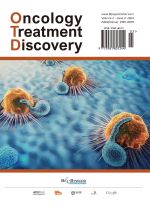Abstract
Objective: To investigate the expression of Doublecortin-like kinase-1 (DCLK1) in the serum of gastric cancer patients and its relationship with carcinoembryonic antigen (CEA), carbohydrate antigen 19-9 (CA19-9), and carbohydrate antigen 72-4 (CA72-4). Methods: Fifty patients diagnosed with gastric cancer at the hospital from January to December 2021 were selected as the gastric cancer group, and 50 patients diagnosed with chronic atrophic gastritis during the same period were selected as the control group. The serum concentrations of DCLK1, CEA, CA19-9, and CA72-4 were measured in both groups. Cut-off values and AUC (Area Under the Curve) were determined based on the ROC curve, and the expression of DCLK1 and its relationship with CEA, CA19-9, and CA72-4 were analyzed. Results: The average concentrations of DCLK1, CEA, CA19-9, and CA72-4 in the serum of gastric cancer patients were significantly higher than those in the control group (P < 0.05). CA72-4 had the highest sensitivity (62%), CEA had the highest specificity (98%), and DCLK1 had the largest AUC (0.709). The combined diagnosis of gastric cancer using DCLK1, CEA, and CA19-9 resulted in the largest AUC (0.826), with a sensitivity of 82% and a specificity of 76%. Conclusion: The expression of DCLK1, CEA, CA19-9, and CA72-4 in the serum of gastric cancer patients is significantly higher than that in the control group. The combined detection of DCLK1, CEA, and CA19-9 offers better sensitivity and specificity for the diagnosis of gastric cancer.
References
Sung H, Ferlay J, Siegel RL, et al., 2021, Global Cancer Statistics 2020: GLOBOCAN Estimates of Incidence and Mortality Worldwide for 36 Cancers in 185 Countries. CA: A Cancer Journal for Clinicians, 71(3): 209–249.
Cao Z, Weygant N, Chandrakesan P, et al., 2020, Tuft and Cancer Stem Cell Marker DCLK1: A New Target to Enhance Anti-Tumor Immunity in the Tumor Microenvironment. Cancers (Basel), 12(12): 3801.
Sarhadi VK, Armengol G, 2022, Molecular Biomarkers in Cancer. Biomolecules, 12(8): 1021.
Zong J, Fan Z, Zhang Y, 2020, Serum Tumor Markers for Early Diagnosis of Primary Hepatocellular Carcinoma. Journal of Hepatocellular Carcinoma, 7: 413–422.
Zhang DY, Monteiro MJ, Liu JP, et al., 2021, Mechanisms of Cancer Stem Cell Senescence: Current Understanding and Future Perspectives. Clinical and Experimental Pharmacology and Physiology, 48(9): 1185–1202.
Paul R, Dorsey JF, Fan Y, 2022, Cell Plasticity, Senescence, and Quiescence in Cancer Stem Cells: Biological and Therapeutic Implications. Pharmacology & Therapeutics, 231: 107985.
Ye L, Liu B, Huang J, et al., 2024, DCLK1 and Its Oncogenic Functions: A Promising Therapeutic Target for Cancers. Life Science, 336: 122294.
Nakanishi Y, Seno H, Fukuoka A, et al., 2013, Dclk1 Distinguishes Between Tumor and Normal Stem Cells in the Intestine. Nature Genetics, 45(1): 98–103.
Chhetri D, Vengadassalapathy S, Venkadassalapathy S, et al., 2022, Pleiotropic Effects of DCLK1 in Cancer and Cancer Stem Cells. Frontiers in Molecular Biosciences, 9: 965730.
Wang Y, Yi J, Liu X, 2022, Roles of Dclk1 in the Pathogenesis, Diagnosis, Prognosis and Treatment of Pancreatic Cancer: A Review. Expert Review of Gastroenterology & Hepatology, 16(1): 13–19.
Kalantari E, Razmi M, Tajik F, et al., 2022, Oncogenic Functions and Clinical Significances of DCLK1 Isoforms in Colorectal Cancer: A Systematic Review and Meta-Analysis. Cancer Cell International, 22(1): 217.
Sureban SM, Madhoun MF, May R, et al., 2015, Plasma DCLK1 is a Marker of Hepatocellular Carcinoma (HCC): Targeting DCLK1 Prevents HCC Tumor Xenograft Growth via a MicroRNA-Dependent Mechanism. Oncotarget, 6(35): 37200–37215.
Whorton J, Sureban SM, May R, et al., 2015, DCLK1 is Detectable in Plasma of Patients with Barrett’s Esophagus and Esophageal Adenocarcinoma. Digestive Diseases and Sciences, 60(2): 509–513.
Shibata C, Nakano T, Yasumoto A, et al., 2022, Comparison of CEA and CA19-9 as a Predictive Factor for Recurrence After Curative Gastrectomy in Gastric Cancer. BMC Surgery, 22(1): 213.
Xu Y, Zhang P, Zhang K, et al., 2021, The Application of CA72-4 in the Diagnosis, Prognosis, and Treatment of Gastric Cancer. Biochimica et Biophysica Acta, 1876(2): 188634.
Wang R, Zuo CL, Zhang R, et al., 2023, Carcinoembryonic Antigen, Carbohydrate Antigen 199 and Carbohydrate Antigen 724 in Gastric Cancer and Their Relationship with Clinical Prognosis. World Journal of Gastrointestinal Oncology, 15(8): 1475–1485.
Wang H, Jin W, Wan C, et al., 2022, Diagnostic Value of Combined Detection of CA72-4, CA19-9, and Carcinoembryonic Antigen Comparing to CA72-4 Alone in Gastric Cancer: A Systematic Review and Meta-Analysis. Translational Cancer Research, 11(4): 848–856.
Nahm FS, 2022, Receiver Operating Characteristic Curve: Overview and Practical Use for Clinicians. Korean Journal of Anesthesiology, 75(1): 25–36.
